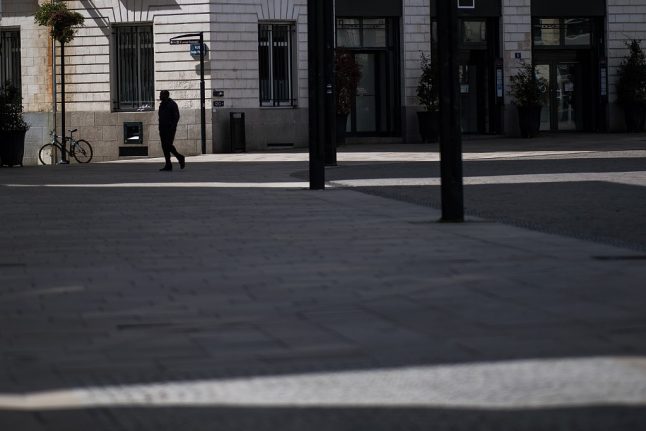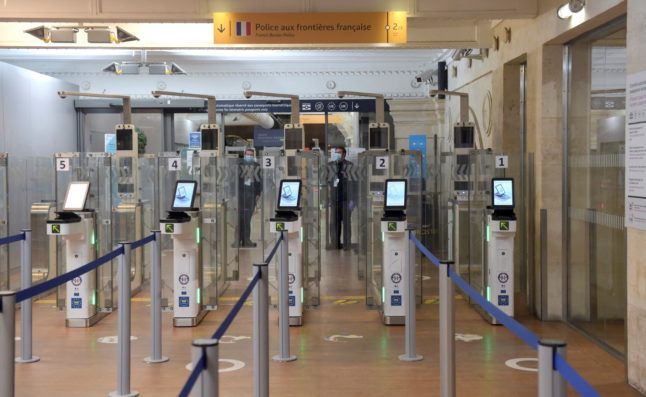The basic premise of the lockdown in France is that you are only allowed out of your home to make essential trips, and on every trip you need to have with you a signed, dated and timed permission form.
Police are operating road blocks and stopping people on the street to check that they are complying with lockdown rules and failure to do so can result in hefty fines and even jail time.
READ ALSO France's lockdown form – your questions answered

You can be fined for being out of the house for a reason deemed 'non essential' or for not having the correctly filled out form with you, even if your trip is essential.
The accepted reasons for leaving your home are;
-
To work, if your work is essential and cannot be done from home
-
To shop for essential items. Most shops in France are now closed but food shops, pharmacies and tabacs (tobacco shops) remain open
-
For medical appointments if the appointment is urgent and cannot be done via an online appointment. Many routine hospital appointments have already been cancelled, although urgent care like cancer treatments and dialysis continues. If you have a GP appointment you are asked to choose an online appointment if possible or, if the matter can wait, reschedule it. Women are still able to access pregnancy care and abortions.
-
For vital family reasons eg urgent care for children or the elderly. Simply visiting family is not a good enough reason to be out and the government has previously said that no-one should be visiting people aged over 70 or with serious health conditions except to provide vital assistance. Visiting is banned at all Ehpad retirement homes and care facilities
-
Physical exercise. The rules on this have been tightened in recent days and this is reflected on the form. You can exercise alone, for a maximum of one hour, within 1km of your home. You can also exercise pets under the same conditions, or walk alone or with people who share the home with you.
-
Following a judicial or administrative summons
- Participating in activities in the general interest at the request of administrative authorities. This one is a bit vague, but if you're going to use this one it would probably be wise to have some some of documentation showing that you are out at the request of your local authority.
People are also permitted to go home if they were away from their usual residence at the time of the lockdown, so tourists in France can travel to a port or airport to get home and people normally resident in France can return here. This does not include people who have a second home in France.
In the first few days of the lockdown there was some confusion over the rules and people reported being told different things by different officers.
Some people have also been given verbal warnings by police – in one case a Paris woman was warned that her clothes were not 'sporty' enough to justify a trip out for exercise.
@TheLocalFrance Hey! I just got told off by the police because what I was wearing (jeans and a jumper) for my daily march round the neighbourhood wasn't 'sporty' enough… Happened to anyone else you know??
— pARIS: small capital (@psmallcapital) March 28, 2020
In the first two weeks of lockdown police have handed out more than 200,000 fines and the fines themselves have been increased.
Your first offence will now cost you €135. If you commit second offence within 15 days, you get a €200 fine. The fine can increase to €450 if you don't pay it within 45 days.
Anyone who breaks the rules four times within 30 days faces a fine of up to €3,750 and a maximum of six months in jail.
??? #Covid19 | Pour une application ➕ efficace des mesures de confinement, le décret n° 2020-357 du 28 mars 2020 forfaitise la contravention de 5e classe applicable en cas de récidive.
?1ère sanction : 135€ d'amende
➡️ Récidive ds les 15 jrs : 200€ d'amende, majorée à 450€ pic.twitter.com/INy5MG2fDj— Ministère de l'Intérieur (@Place_Beauvau) March 29, 2020
But what if, having read all that, you still believe that the fine you were given is unreasonable?
Well you can contest it, and the process is the same as for contesting speeding tickets and other fines.
If you are fined during lockdown you are given a ticket by police with details for paying the fine (police will not ask you to hand over cash in the street, as some scam artists have done).
If you want to contest it you can do so online with the Agence Nationale de Traitement Automatisé des Infractions (National Agency for Automated Offence Processing) in the désignation et contestation section.
You will be asked to fill in a form withe the details of your fine and you will then be invited to state the reasons you believe it was unreasonable.
All appeals must be filed within 45 days of the fine being given.



 Please whitelist us to continue reading.
Please whitelist us to continue reading.
Obey the rules, don’t try & get out of them just because you are a Brit.